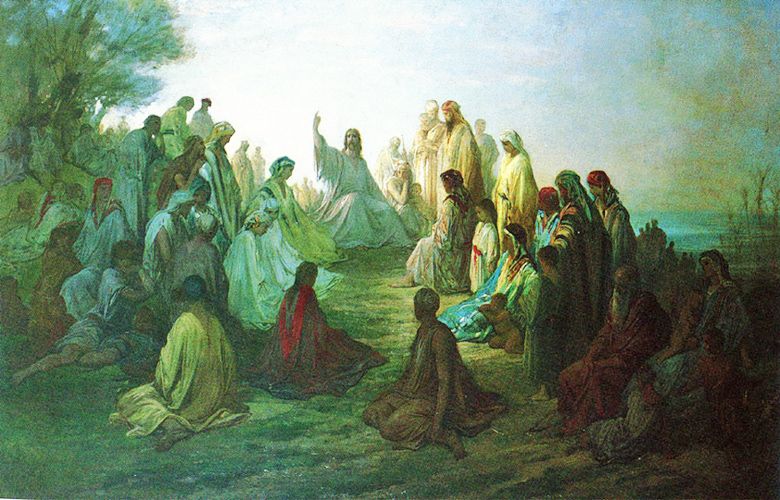
Rich Man, Poor Man
The first consideration in understanding this story regards whether or not Jesus is actually revealing pertinent information on a spiritual afterlife in Sheol, or is this simply another parable. There are four reasons that make it clear that the story and not a parable. First and foremost, Jesus does not start as He usually does by calling the story a parable. Second, a parable was always based on common everyday situations that his listeners dealt with as a way to help teach a powerful spiritual truth. This story is about an everyday event but the event is death. And the story makes a strong spiritual truth but the truth is an explanation on why some spirits go to Heaven and some to Hell.
The idea of an eternal spirit was a hotly debated subject among Jewish scholars. Some believed scripture made several vague remarks concerning some form of existence after death (Genesis 15:15; Deuteronomy 31:16; Judges 2:10; I Kings 1:21). Others reasoned that because there was no clear information given in the Torah {the first five Books of the Bible} concerning an afterlife, there was no existence after death. Third, Jesus never gave names to the characters in His parables. The fact that Jesus gives two specific names to the characters involved, strongly suggests that He is recounting an actual event. Fourth, the story gives vivid details about the afterlife. It tells us that a person does in fact have an eternal spirit. That this spirit leaves the body at death. That the spirit goes to a place down in the Earth known as Sheol or Hell. That there are two types of spirits, those of the repentant righteous and those of the un repentant unrighteous. That while there is one location where these spirits reside, the conditions under which they exist are completely different. That the sprit is never in a state of unconsciousness. The spirt knows who they are, where they are and why they are there. And finally, a spirit can think, see, hear, feel and communicate with other spirits.
The issue concerning whether or not this story is a parable continues to plague Biblical scholars. The reason for this is that scholars see a story as being either literal, figurative or prophetic. However, God regularly speaks to the prophets in all three of these ways at the same time. So, the story is literally one about three men who once lived, had names and died. The story is figurative in that it explains by example that in life, different people receive variations in the amount of material wealth they obtain. But, the secret of life is not simply about enjoying the passing of time. The secret of life is about spiritual growth. And spiritual growth can only come by way of faith in God. And faith in God shows itself by studying scripture and following his commands. And His number one command is for a person to love Him and their fellow man. The story is also prophetic in that it shows exactly what happens to the eternal human spirit in death and that the righteous and unrighteous will absolutely receive well-deserved rewards (Hebrews 9:27).
In ancient times, it was assumed that the rich were blessed by God while the poor must be under a curse of some sort. Jesus is about to reveal that this is not true as the outcome of this story turns this understanding completely on its head. At His own death, Jesus’ had to commanded His spirit to leave His body so that He could experience death as do all people. He put the care of His spirit into the hands of God the Father. Because Jesus was human by way of His mother, His eternal spirit descend down into Sheol as did all the spirits of all people at this time. There, He preached the Good News that He, as Messiah, had brought the offer of eternal life to mankind. He also announced to the spirits of the righteous dead that they will soon be brought up out of Sheol and into the presence of God.
Jesus starts His story by saying there was a certain rich man, who was clothed in fine purple linen apparel and ate sumptuously every day. There has always been a difference in being well off and extremely wealthy. The extremely rich could afford to buy clothing of the finest linen and then have them dyed in purple. This was the most expensive color to produce as it came from the shell of an extremely small snail found only in the Mediterranean Sea. Purple was worn by the ultra-wealthy, the powerful and by the Temple’s highest ranking religious leaders and priests. The fact that the man could eat continuously throughout the day on a variety of vegetables, meats and wine was another show of extreme wealth. In other words, he had an overabundance of all he needed. Jesus could have also named this man at this time but it would have immediately cause consternation among His followers and outrage in the populous. So instead, He will give us cryptic clues as to the mans identity later on in the story.
Next Jesus introduces a second person by the name of Lazarus who, for whatever reasons, has fallen on hard times, lost his health and been forced to beg in order to survive. Because he has obviously received no assistance from the Jews in his community, he might have been a gentile living in a predominantly Jewish town. This is not the Lazarus that Jesus raised from the dead. We can be sure of this because that Lazarus was still alive when Jesus told this story. The name Lazarus in Greek is Eleazar. Abraham, who is the only other person named in this story, was said to have sent Eleazar his servant to Sodom to test the hospitality of its citizens. There he found a poor, weak and wounded man who had his clothing stolen and a judge that found no reason to convict the perpetrator of a crime that involved taking advantage of a poor person (Book of Jasher 19:12-15).

Lazarus was laid at the rich man’s front gate probably by family or friends as they were no doubt also poor and unable to feed nor provide medical help. The thinking must have been that Lazarus was so emaciated and sick that surly the rich man, coming and going from his house, would have mercy on him and provide help. If not, he was as good as dead and nothing more could be done. Thus, the life of Lazarus was literally put into the hands of the rich man. Lazarus’ chronic lack of food had also caused a series of medical issues including skin lesions. This issue was rampant in the ancient world due to poor hygiene practices that often led to leprosery (Luke 16:20). So, it was hoped that the rich man could order his servants to clean Lazarus’ wounds, give him water and the table scraps swept up and destined for the garbage dump. Thus, Lazarus was not even expecting as much as what the rich man fed his house dogs.
We are then told that dogs would come and lick the sores on Lazarus’ body. We are not told if these were dogs owned by the rich man and used to guard his estate, or if these were just feral street dogs. Dogs were an added expense that the majority of people could not afford. The rich had well-kept house pets while the poor that had pets, were forced to allow them to roam the streets scrounging for food. House dogs are not listed by Jewish Law as being ritually unclean. However, because street dogs went to the town dump for food, when they returned home, they were not allowed inside the house. This is because the unclaimed bodies of the poor were often taken to the dump and burned along with household garbage. Therefore, a dog feeding at the dump may pick up a variety of dangerous contaminations and bring them back to their owner.
To a modern reader, the idea of dogs licking the wound on a human being is not only revolting but also seen as a malevolent action. The idea being that Lazarus is so weakened by illness brought on by starvation that the hungry dogs have been attracted to him and are licking him in anticipation of their next meal. And Lazareth, in his incapacitated condition, literally does not have the physical strength to drive them away. But in fact, while these dogs were considered the lowest of creatures, they none the less had a basic instinct to help another suffering creature by licking its wounds. This then should be seen as a benevolent action showing more sympathy and kindness than did the rich man. The dogs were instinctively attempting, in their own way, to nurse Lazarus back to health. The rich man had more compassion for his dogs than he did a fellow human being. Thus he considered Lazarus lower than an animal.
The Greeks considered dogs as healers of wounds. Sacred dogs were kept by pagan temple priests and were regularly called upon to provide what appeared to be miracle cures by licking the wounds of worshippers. Today we know that the tongue of a dog is effective in cleaning dirt and debris out of a wound. Their saliva contains a protein called histatins that wards off infections and prompts the cells on the surface of the skin to close over the wound more quickly and thus help to promote healing. The saliva also contains nitrites which also help prevent the spread of an infection. So while the highly respected rich man showed no empathy or compassion for Lazarus, the lowest of animals instinctively showed compassion for the lowest of men. The dogs gave Lazarus unconditional love, true companionship, cleaned his wounds as best they could and kept him warm and safe in the street at night (Luke16:21).
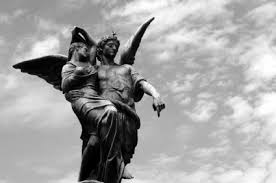
We now learn that the rich man did not help Lazarus but would instead literally walk around or step over Lazarus in order to conduct his business. Lazarus’ health deteriorated to the point that he died of exposure while laying by the gate to the rich man’s estate surrounded by his only loyal companions which were dogs. One might think that a common beggar, not seen as a person of worth in life, would not be deserving of a place of worth in the afterlife. He contributed little in this life thus, he should reap little or nothing in the afterlife. But Jesus tells us that just the opposite occurred. When the beggar died, his spirit was escorted by an entourage of Guardian angels down into Sheol to the Land of Paradise, and into the very presence of the grand Jewish patriarch Abraham. So Jesus is telling us that, no matter a person’s situation in life, if they have kept their faith in God, at death their spirits will be escorted by angels to a place of beauty and rest.
It should be noted that this was the process for departed spirits from the time of Adam until the time of Christ. Before His resurrection, when a person deemed righteous in the eyes of God died, their spirit was released and escorted down into Sheol. There they waited in comfort for the time when they would be allowed into Heaven and the presence of God. However, while they were deemed righteous by God through faith, they had still created a sin debt during their lives that had to be paid in full in order to be considered fully righteous by a Holy God. Jesus would pay off this debt on the cross. Then, after His resurrection, He returned down into Sheol to lead the righteous spirits in Paradise up and into the safety of His presence. From that day forward, all the spirits of the righteous, at death, go immediately to be with Christ (Ephesians 4:8; II Corinthians 5:8).
However, Jesus tells us that when the rich man died, no angels came to escort him into Paradise. Instead, his spirit was judged and confined down in Sheol in the Land of Torment. Jesus simply refers to this event in seven words, “the rich man died and was buried”. Meaning that, while his corpse was no doubt embalmed with expensive spices, wrapped in the finest linen and buried in a prominent location for all men to see, his immortal soul was unceremoniously pulled down into Sheol. There it was confined in a place removed from God which instantly causes torment, anguish and pain (Luke 16:22).
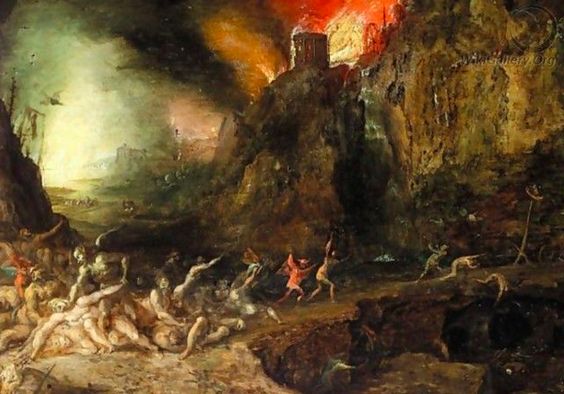
Jesus then says that the rich man, understanding he was dead and in torment, did not repent of his sins and beg for mercy. Instead, he looked up and saw Abraham in the distance relaxing in the Land of Paradise with Lazarus the beggar resting comfortably by his side. The rich man cried out to Abraham and asks that he have mercy on him. He was implying that as a fellow Jew, he was a descendant of Abraham and therefore they shared a common blood bond. He apparently also thought that the great patriarch Abraham had the power to intervene and help him in his hour of need. So he asked Abraham to do him a favor by commanding a lowly peasant such as Lazarus to dip his finger in water and bring him a drop to lick off with his hot parched tongue in order to help quench the pain of thirst.
It should not be lost on the reader that the last detail we have on Lazarus just before his ignominious death, concerned the burning pain from his sores being soothed and cooled by the wet tongues of dogs. The first detail we learn about the rich man who is now in misery is that he begs for a wet tongue to cool and sooth his pain as he was being tormented by heat emanating from a flame of fire (Luke 16:24). So, the rich man who had adamantly refused to send his servant to Lazarus to provide food and water, was now asking Abraham to command his assumed servant Lazarus to bring him water to ease his pain. This story also tells us that the spirit of a person has what might be called a spirit body. This body, according to the story, can be seen by other spirits and recognized, has an intellect and memory, the abilities to see, feel pleasure and pain and to communicate with other spirits.
Abraham now answers the rich man request by explaining the predicament that he has freely put himself into. Abraham reminds his fellow Jew that during his lifetime, he had the good fortune to earn or perhaps inherited significant wealth. On the other hand, Lazarus experienced a series of occupational failures and health setbacks. But, because Lazarus continued to have faith in God throughout his ordeal, he was judged as righteous and rewarded with comfort in the afterlife. However, the rich man became singularly focused on his wealth and came to believe that he did not need God. Instead, he dedicated himself to a life of making money and living in luxury. Therefore, he had shown no love of God nor his fellow man, one of whom had literally and slowly starved to death at his gate (Luke 16:25). Abraham is explaining to the rich man that he did not end up where he was because he was rich, but because money became his god of choice to the exclusion of those around him. He freely chose the path of material comfort over the desires of God and the needs of those less fortunate (Mathew 12:40). Jesus is clear that in the eyes of God, to those whom much is given, much is expected and that the meek shall inherit the Earth (Luke 12:48; Matthew 5:2-5).
Abraham then goes on to say that while he has sympathy for the situation the rich man now finds himself in, he was completely unable to help him. He explains that there exists a great divide between the two lands and the two types of people contained in each. At death, a person is either on the right side of God or the wrong side of God. There is no middle ground between the two that allows one to cross over to the other. Abraham goes on to say that while the righteous loving spirits on his side of the divide have empathy for him, they also cannot cross over to him. And conversely, those suffering cannot pass over the divide to take advantage of the rewards given to those in Paradise. The gulf is fixed and so their situations are fixed (Luke 16:26). This inability for the spirits of the dead to cross the great divide of the afterlife is also proof that the occult have no ability to talk with the spirits of deceased humans.
The rich man then calls out in desperation to Abraham and begs him to send Lazarus to his father’s estate. There he should tell his five brothers what has become of his fate in the afterlife and that they should change their selfish ways in order to be spared from his fate of torment (Luke 16:27-28). The rich man’s family were apparently also under the false impression that because they were Jews and thus the seed of Abraham, and because they were rich, they were obviously blessed by God. Therefore, if there was an afterlife, they were guaranteed to be a part of it. Documents from the first century show that not only were the Jewish religious leaders divided on the issue of an afterlife, they had dozens of theories on the subject. And, the issue of a spiritual afterlife continues to be hotly debated among the Jewish scholars to this very day. Please see related Paper, "Jewish Doctrine on Death".

Now we have come to a hidden prophecy contained in the story concerning the High Priest Caiaphas and the final judgement he will receive as a major player in the arrest and subsequent execution of his Messiah. Caiaphas knew that Jesus followed the Law and spoke only the truth. But Caiaphas saw himself as tasked with saving the Jewish religion as founded not on faith as it was with Abraham and the patriarchs, but on the Law as it was with Moses (Genesis 15:6; Exodus 19:7-8). He was right in understanding that the change in Jewish practice from Law back to only faith plus nothing else would completely destroy the 1,500 year old Temple system of Laws and customs. And, that this fundamental doctrinal reversal to the time of the patriarchs would cause a civil war between those that practiced the Covenant of the Law and those who would practice the Covenant of Grace and Mercy as taught by Jesus. Therefore, in the eyes of Caiaphas, the truth of Jesus was an existential threat to Judaism not seen since the time of Moses. Jesus was an inconvenient truth that must be stopped at any cost. In the past, Jewish leaders sometimes referred to as zealots, were executed by Rome for sedition or stoned to death by the Temple court for blasphemy. Either way, the death of all radical movement leaders had always quickly ended the brewing revolution. Caiaphas concluded that he would need to do the same with Jesus (John 11:50). Once dead, the movement of Jesus as Messiah would come to an abrupt end.
Jesus, on the other hand, knew that the Jewish leaders at the highest levels were starting to suspect that He might be the Messiah. The major hurdle was that they were expecting a charismatic military leader to overthrow the Roman occupation not an itinerant preacher of peace. But Jesus would judge the leaders not on what they were thinking but their actions. And, because many of them knowingly plotted to kill the man they highly suspected was the Messiah, they would be judged harshly for their actions. They would be judged as the generation that committed the unforgivable sin (Matthew 12:30-37). While this was the harshest of penalties in the afterlife, there was a reason for it. Because of their willful decision to assist in the execution of Jesus based on a lie that they themselves contrived, the Jewish race would wander the Earth for two thousand years looking for a safe city to escape constant persecution. More importantly, there would be two thousand years or forty generations of Jews living and dying in sin because they actively rejected Jesus based on the decisions made by a few corrupt men determined to stay in power. The responsibility for the destruction of Jerusalem, Israel, the two thousand year diaspora and the unnecessary pain and suffering of the Jewish race can all be traced back to the decisions made by a few spiritually blind, greedy and power hungry men. They made a conscious decision to reject their Messiah sent from God on behalf of their nation and their race has paid a heavy price ever since then.
As for Jesus, He always knew that His destiny was death by crucifixion, burial in a borrowed tomb and His ultimate resurrection. He knew that Judas would betray Him and the Temple Priest along with Caiaphas would turn Him over to Rome for execution. So, at the end of his trial by the religious leaders, He gave a personal prophecy to Caiaphas. He told him that He was the Messiah, the Son of God. He then quickly added,”… I say to you, that in the future you will see the Son of man sitting on the right hand of power, and coming in the clouds of heaven.” (Matthew 26:64). So the question is, from what vantage point would or did Caiaphas see this event? Did he see this vision while he was still alive, or will he be allowed to witness it from down in Sheol, or both?
The common belief during the first century was that Jesus’ return to Earth was eminent. Even Paul believed that Jesus would probably return in his lifetime. This belief is what caused the Apostles and other believers to work so diligently to spread the Gospel and save as many soul as possible as quickly as possible. While Jesus made it clear that He did not know the date that God the Father would give the command for His return, He did know that He would establish a church movement that would spread throughout the earth. Then, when the Gospel had been preached around the world, he would return and establish the Kingdom of God (Matthew 16:18; Matthew 24:14). So Jesus knew that His return was not eminent. In fact, He would give the Apostle John a detailed account of the timeline of his Second Coming in the Book of Revelation.
As for the hidden prophecy, Jesus knew where Caiaphas would be in order to see Him in power and glory. The first place Caiaphas may have seen a vision of Christ standing at the right hand of God was during the stoning of Stephen. He was tried by Caiaphas and found guilty of blasphemy. He was immediately taken out of the city and stoned to death. But just before the first stone was cast, Stephen looked up and said he saw the heavens open and Jesus standing at the right hand of God. If Caiaphas was there and looked up, perhaps he was allowed to see the same vision that Stephen saw. If so, this would have caused him to seriously reconsider what he had done to Jesus. And, this would help explain a somewhat recent archeological discovery made in Jerusalem concerning the way he was buried.
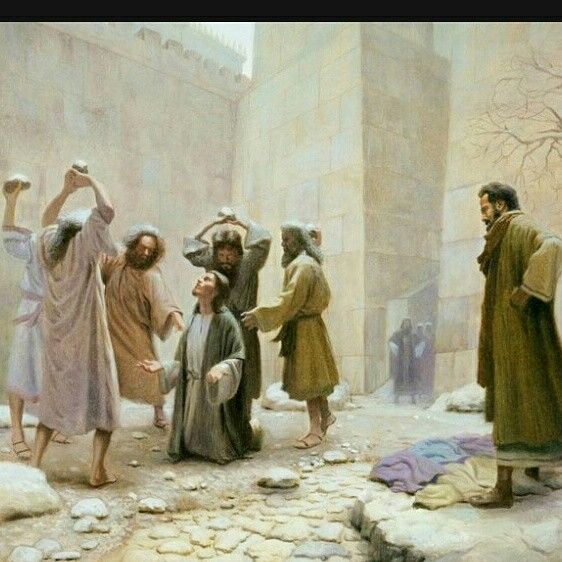

In November of 1990, a road construction crew discovered the family tomb of Caiaphas. When archeologists excavated the tomb, they discovered his ossuary or bone box and opened it. Inside they found the bones of a sixty year old male and a crucifixion nail. They found a second nail on the ground inside the tomb (David, Ariel, “Are These Nails From Jesus’ Crucifixion”, Haaretz (Oct.12,2020). The presence of these two nails may imply that Caiaphas had developed serious concerns during the final years of his life about the hasty decision to have Jesus killed. But, because Rome burned all Jewish records held in the Temple at Jerusalem in 70 A.D., we will never know what Caiaphas’ final thoughts were on this subject.

The second location from which Caiaphas will most likely witness the Second Coming of Christ could be from his captivity in Sheol. While Sheol is down in the Earth, God could easily make it possible for Caiaphas or even all those held there to be able to look up and, for one brief shining moment in time, wittiness the greatest supernatural event since creation. The Creator of all that exists, surrounded by the Glory, power and armies of God, returning to take back control of the Earth and usher in the Kingdom Reign of God (John 1:1-3).
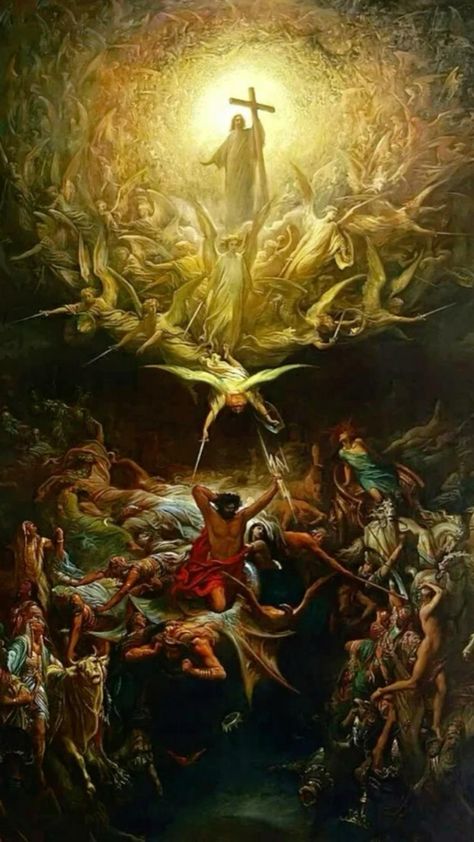
A third and final possible location where Caiaphas will certainly see Christ in His glory, would be at his trial. The Book of Revelation tells us that on the last day of the Millennial Reign of Christ, the Earth is will be purified by the fire of the Holy Spirit. This must occur in order to prepare it for the impending residing of the Triune Godhead. At this same time, Sheol is emptied out and its inhabitants are raptured to a place where they are judged by Christ. This event is known as the Great White Throne Judgement. This will be a place where Caiaphas will see the man He personally knew as Jesus, now sitting on a white throne judgment seat and judging him along with all determined unrepentant people (Revelation 20:11-15). So, the prophecy Jesus gave to Caiaphas concerning his seeing Him sitting on the right hand of power and coming in the clouds of Heaven will happen, it’s just a matter of when and where.
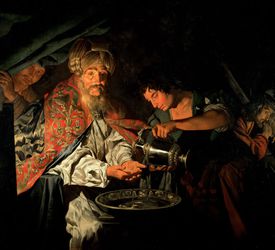
This veiled prophecy concerning Caiaphas in further backed up by other clues Jesus gives us in His story. Jesus said that the rich man was extremely wealthy, dressed in purple, was powerful, ate sumptuously, lived in a mansion and did not care for his fellow man. We know that Caiaphas was extremely rich due to his pilfering of the Temple taxes, fees and donations. We know that He dressed in a purple robe as High Priest (Exodus 28:32). The Pharisees also wore purple robes with long tassels tipped with small bells. We know he, as did the Chief Priests, ate grand meals and lived in mansions. In fact, the mansion of Caiaphas is still standing on the side of Mount Zion. It is large and impressive with three levels and an open court yard. Archeologists have also unearth the homes of Temple priests and they are opulent with rooms for servants, feasting, kitchens and multiple bedrooms. They also have high ceilings, mosaic flooring and murals painted on the walls with patio gardens.
We also know that the priests had no time for the poor and infirmed. This was because the poor did not contribute to the temple and were often handicapped, diseased and or mentality impaired. Thus, by the Mosaic Laws concerning purity, they were not allowed to enter the Temple and worship. The poor were also ritually unclean and as such, the priests were not allow to touch them or go inside their homes. Therefore, Caiaphas would have stepped over a beggar and moved away quickly so as not to become contaminated. The Jewish welfare system was to allowed beggars to congregate near the entrances of the Temple and worshippers were encouraged to give them food and or money.
But, more to the point of the prophecy, Caiaphas had 5 brothers each equally corrupted with power. All five served as High Priest after Caiaphas and persecuted the Church that Christ established. Thus, Abrahams response to the rich man’s request was all the more ominous. Abraham replied, “… They {his brothers} have Moses and the prophets {just like you had}; let them hear {believe} them" (Luke 16:29; Matthew 5:5). Moses even prophesied the coming of Jesus but they also ignored him (Deuteronomy 18:15). The prophets all spoke of the coming Messiah and what He would accomplish but the religious leaders were now looking for a mighty general of war to end the Roman occupation. Not a peace loving rabbi from the backwater town of Nazareth followed by a rag tag group of blue collar zealots.
The rich man told Abraham that he was wrong and that his brothers would listen to Lazarus because he would be seen as having been resurrected from the dead (Luke 16: 30). But Abraham only shook his head and said, “…If they hear not {the words} of Moses and the prophets {and obey}, neither will they be persuaded {change their behaviors} though one {Jesus} rose from the dead.” (Luke 16:31) This was a prophecy from Jesus concerning the reaction of the Jewish religious leaders. They would hear a first hand eye witness report from the soldiers that Jesus arose, but they would still refuse to believe. The religious leaders kept asking Jesus more and more questions trying to trip Him up by using His own words against Him. They also demanded to see more and more signs and wonders only to conclude that His healing powers must be coming from Satan. The Temple’s own trusted guards told the Chief Priests that they had witnessed Jesus' resurrection from His tomb yet they paid them hush money not to tell the public what they saw but instead to tell a lie (Matthew 28:11-15).

As a case in point, just a week before Jesus' last Passover, He raised His close friend Lazarus from the dead. In return, Lazarus bore witness of Jesus as the Messiah. His ministry was so compelling that he started receiving death threats from the religious leaders and was forced to move to the Island of Cyprus where he lived out his life preaching the Gospel. Please see related paper, “Lazarus: Back From the Dead But Paid a Grave Price”
The moral of the story is that since the time Adam ate the forbidden fruit from the Tree of Knowledge, all mankind is now born with a flesh nature. This influence overwhelms the intellect and causes all mankind to sin. To help man resist this nature, he must be born again in the spirit. This requires a person to admit to themselves and God that they are a sinner, they must then repent of their sins and ask God in the name of Christ to send the Holy Spirit to indwell them. The Holy Spirit will immediately indwell the person and cause them to experience a higher consciousness which includes a more well-tuned conscience and empathy towards their fellow man. It is this increase in conscience that helps a born again person make better decisions which in turn causes them to be less prone to sin. A person will always sin in some ways, but now they are in Christ and thus forgiven of their sins.
So, currently the world consist of two types of people. Those born in the flesh and who have made a conscious decision to remain that way, and those who have made a conscious decision to be reborn in the Spirt. These two types of people are incompatible with each other. Therefore, at death, their spirits are sent into two different places as the unrighteous do not want to be with the righteous and vice a versa. The place of eternal rest is a decision that each person must freely make in life. Even if one refuses to make a decision in this matter, they have none the less made a decision in the eyes of God. Make your decision today!
On a closing note, scholars believe that Jesus may have alluded to a secondary way to eternal salvation through a statement He made. He said, …I am the way, the truth, and the life: no one comes unto the Father, but by me.” (John 14:6) So, it may be that those people who live in remote locations and have never had the opportunity to hear the Gospel but had faith in a Creator God and loved their fellow man, will be allowed by Christ to enter into Heaven and into the presence of God the Father. This would be the same way the patriarchs were considered or counted as righteous through their faith in God (Genesis 15:6). There are a few religious sects comprising one percent of the Christian faith, that believe an unrighteous persons spirit is confined in Sheol for only as long as it takes for them to come to the realization that God is their Creator and that they need to repent of their sins in order to be able to commune with Him. At that time, they are released from Sheol and are allowed by Christ into Heaven. However, the traditional translation of scripture does not convey this idea. So, the only question is, do you feel lucky and are you willing to roll the dice concerning the eternal resting place of you immortal soul. Or, do you want to take the guaranteed way to Heaven. The choice is yours to freely make.
If you enjoy the information provided on this site, please consider making a donation of any amount to help continue its production. Donate Now